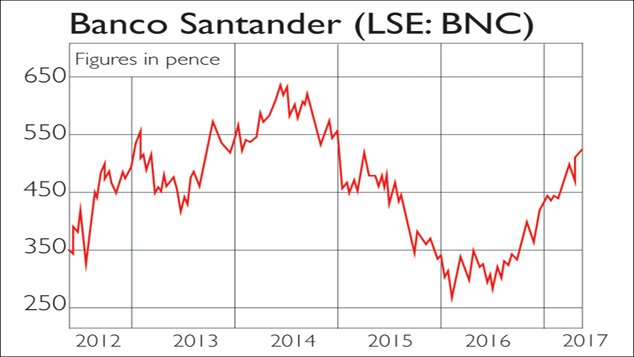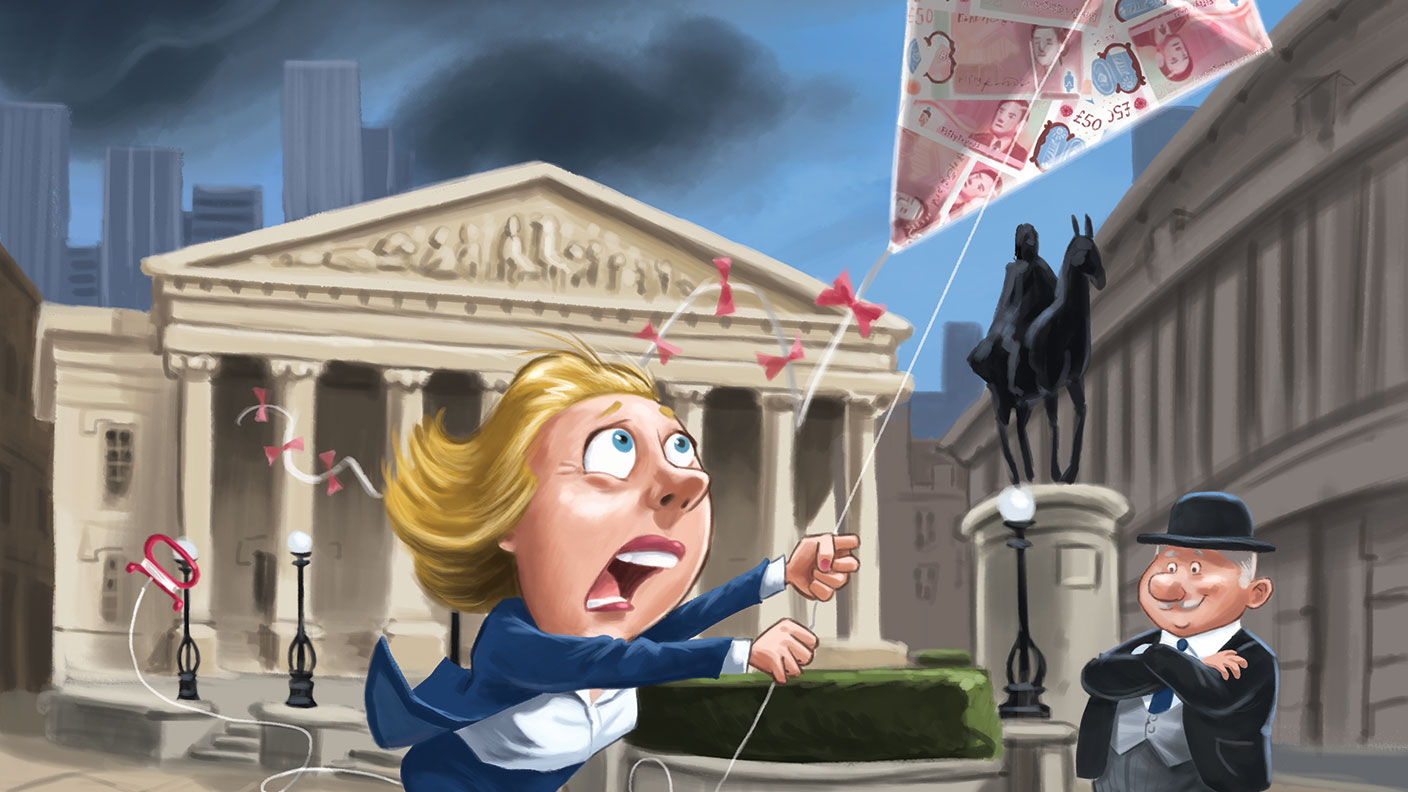Macron’s victory heralds a new dawn for Europe
The last eight years have seen Europe stagnate, but now the long-delayed recovery may finally be taking place. Matthew Partridge looks at how to profit.

Get the latest financial news, insights and expert analysis from our award-winning MoneyWeek team, to help you understand what really matters when it comes to your finances.
You are now subscribed
Your newsletter sign-up was successful
Want to add more newsletters?

Twice daily
MoneyWeek
Get the latest financial news, insights and expert analysis from our award-winning MoneyWeek team, to help you understand what really matters when it comes to your finances.

Four times a week
Look After My Bills
Sign up to our free money-saving newsletter, filled with the latest news and expert advice to help you find the best tips and deals for managing your bills. Start saving today!

The last eight years have seen Europe stagnate, but now the long-delayed recovery may finally be taking place. Matthew Partridge looks at how to profit.
The past decade hasn't been great for Europe, particularly the 19 countries that comprise the eurozone and at the start of this year, things looked even more precarious than ever. The financial crisis had exposed the inherent flaws in the single-currency project, while a lack of reform, especially in labour markets, has held back economic growth. Even today, at a time when the UK, US and Japan are at or near full employment, eurozone unemployment still stands at 9.5%.
This poor showing has bolstered the cause of populist parties across the continent looking to break up the European Union (EU). As 2017 dawned, it looked as though the big financial news story of the year might be the victory of the anti-EU Front National in France, a subsequent French referendum and a break-up of the entire European project. And that's before we even consider the disruption of Brexit.
MoneyWeek
Subscribe to MoneyWeek today and get your first six magazine issues absolutely FREE

Sign up to Money Morning
Don't miss the latest investment and personal finances news, market analysis, plus money-saving tips with our free twice-daily newsletter
Don't miss the latest investment and personal finances news, market analysis, plus money-saving tips with our free twice-daily newsletter
Yet things have changed rapidly. Last week, pro-European, pro-reform Emmanuel Macron emerged triumphant in the French presidential election, removing for now at least the biggest political risk of the year for financial markets. Less headline-grabbing, but arguably equally important, is a recent slew of improving economic data that suggests a turning point has been reached and recovery is on its way. Even potential problems with agreeing an orderly post-Brexit trade deal with the UK might not stop the recovery. The markets are waking up to the good news the Eurostoxx 50 index, the main eurozone stock index, is now more than 33% higher than it was after last June's Brexit vote. Yet there's plenty of value left to be had.
The turning point is behind us
First, there's that economic recovery. Last month, the Markit Eurozone Composite PMI which effectively shows how bullish companies in both the services and manufacturing sectors are feeling came out with a reading of 56.8, well above the average for the past 50 years. (Above 50, businesses are expanding; below 50, they're contracting.) Meanwhile, corporate profits are rising for the first time in ages. "Usually at the start of the year we get high earnings growth forecasts which then get cut as the year unfolds," notes Adrian Lowcock, investment director at asset manager Architas.
Typically, at this point over the past few years, earnings estimates would have been downgraded by about 5%. But this year, first-quarter earnings are coming in, and rather than managing expectations lower, companies "are actually raising their forecasts". They are looking at an average of 10% earnings growth in Europe, which "hasn't been seen for five years".
"The recovery is clearly real," agrees Samy Chaar, chief economist at Banque Lombard Odier. In fact, if you look closely at the data over the past three years, "you can see that it has already been taking place for quite some time". For example, GDP growth has been in line with that of the rest of the developed world over the past year. This is feeding through into the wider economy, with unemployment falling to more normal (albeit still relatively high) levels. The banks, having survived stress testing and a long period of deleveraging, are increasing lending again, and both consumers and companies are opening their wallets once more.
This pick-up in growth does raise concerns that the European Central Bank (ECB) could increase interest rates or stop printing money to buy government bonds (quantitative easing), and choke off the nascent recovery. However, given ECB boss Mario Draghi's tone at recent meetings he was a little more upbeat about growth but showed no concern over inflation, and no desire to change policy in the near future this seems unlikely. Matthias Hoppe, portfolio manager at Franklin Templeton Solutions, notes there's still a lot of slack in the system, which means we may not see rising core inflation.
Political risk has fallen sharply
Until now, the biggest drag on European stocks has been the heightened level of political risk. Britain's decision to vote for Brexit and Donald Trump's surprise victory in the US led to fears that a populist politician would take office in a European country, standing on a platform of leaving the EU. Fears were particularly high for what could happen in France shortly after Trump's victory, the bookies gave the far-right Front National leader Marine Le Pen nearly a one in three chance of becoming president.
Meanwhile, anti-EU movements in Austria (FPO), Holland (Geert Wilders), Italy (Five-Star Movement) and even Germany (AfD), also surged in the polls. "Had Le Pen won, it would have put into question the existence of Europe," admits Chaar. However, her defeat in the second round of the French presidential election "means that the risk has receded a lot".
Italy is now the biggest political concern for the EU, with elections due in the next 12 months. However, defeat for the far right in Austria and Holland, and the effective marginalisation of the AfD in Germany, has forced Italy's Five Star Movement to moderate its views. It has tried to rebrand itself as eurosceptic, rather than outright anti-EU in January, leader Beppe Grillo even tried to take the party into a moderate grouping in the European parliament. Thus far eurozone electorates have proved unwilling to risk the potential damage to their savings involved in abandoning the euro.
Of course, anti-EU movements will still have some traction "until the underlying causes are mitigated", notes Hoppe. The biggest of these is the sovereign-debt crisis, with the most highly indebted states unwilling to leave the euro, and Brussels unwilling to bail them out. However, Macron's victory and pro-European views he's keen on further integration, and he's not afraid to say so raise the possibility "that he will help resolve the euro's structural problems", says Hoppe.
The chances of a wholescale debt write-off being agreed for the likes of Greece would depend on "how Germany will behave after the election in September" concerns over how the German electorate might react will prevent German politicians from softening too obviously before the vote is over. But at the very least, "a stronger French-German axis could well relax the fiscal austerity that has been dictated by Germany over the last couple of years".
Whatever the exact timing, "debt relief will come at some point", predicts Chaar. But in any case, "the crisis is largely solved". This is because "all countries now have a current account surplus" in other words, other than debt repayments, the tax-take is higher than government spending. In practical terms, this means that since they don't have to borrow money from the market for any other reason than to refinance expiring debt, they can fund themselves even if there is a sudden loss of investor confidence or a hike in interest rates. This allows these nations to shift the focus to reforms that can boost growth, instead of just cutting spending.
Brexit will have a limited impact
Britain's decision to leave means that within the next few years the EU will lose its second-largest net budget contributor after Germany. This will force Brussels either to cut back on spending programmes, or (more likely) force already cash-strapped countries to pay more. The EU-27 also runs a sizeable trade surplus with the UK, even after services are taken into account in other words, they export more to the UK than we sell them. This means that if Britain leaves without a trade deal, many companies and firms on the continent, especially in the manufacturing and engineering sectors, will lose an extremely important customer.
What sort of impact could that have? Well, Europe's potential losses will be large in absolute terms. However, the blow will be spread across a population that is nearly seven times larger than Britain's (445 million versus 65 million) and an economy that is more than six times bigger ($17.9trn vs $2.9trn in purchasing power parity terms). Viewed in this context, even Britain's "membership fee" (gross contributions minus the rebate) of around £13bn a year works out to less than 0.1% of GDP.
According to Hetal Mehta, European economist at Legal and General Investment Management, a good "rule of thumb" is to assume that for every 1% Brexit shaves off Britain's GDP, European GDP will decline by 0.25%. And the real impact may not be felt until several years after Britain formally leaves. Charles Grant of the Centre for European Reform reckons a deal is unlikely to be done within the two-year deadline, and that Britain may have to sign up to a transitional deal that would involve making further payments to Brussels.
Which sectors and countries look attractive?
European stocks are no longer at the bargain-basement levels they were a few years ago. "It is fair to say the market has already begun to price in some future growth as the economic outlook has improved," agrees Lowcock. However, if you look at the long-term Cape (cyclically adjusted price/earnings ratio), which uses ten-year average earnings to get a better view of profits over the economic cycle, then the eurozone remains cheaper than the rest of the developed world, especially the US.
With a final resolution to the sovereign-debt crisis coming closer, and growth in the peripheral nations accelerating, fast-growing Spain is one country to pay particular attention to. The IBEX 35, Spain's main index, has surged by more than 40% since June. Yet it trades on a Cape of just 13.4, and pays an attractive dividend yield of 3.4%. It is still nearly a third below its peak in 2007 (whereas the FTSE 100 in the UK has just broken out to a new record high).
On an industry-wide level, Chaar has three main ideas for investors in Europe. He likes cyclical stocks (those that are sensitive to the economic growth cycle); those exposed to emerging markets; and banks. Cyclical and consumer-oriented companies will naturally benefit from the upturn in growth. European companies exposed to emerging markets will do well thanks to the recovery there. As for European banks, rising lending volumes are good news, and when interest-rate hikes do eventually take place, they should benefit. We look at how to profit below.
The best plays on European recovery
There are several ways to get exposure to the Spanish market. The Amundi ETF MSCI Spain UCITS (LSE: CS1) tracks the MSCI Spain index, which follows the 25 leading stocks on the Spanish stockmarket. The ongoing charge is low at 0.25% a year, but be aware that the largest stock, Banco Santander (LSE: BNC), accounts for 20% of the portfolio. Indeed, if you are bullish on Spain, it might be easier to buy Santander outright, as it is likely to benefit from the recovery in lending volumes in Europe. It currently trades at a slight discount to the net value of its assets and on a forward p/e (price/earnings) of 11.8.

German bank Commerzbank (Frankfurt: CBK) underwent a brutal restructuring as part of a bailout. However, it has now been weaned off government support, repaying its loan from Berlin. It is now focusing on increasing its profitability and return on capital. Rising demand for credit should help on this front, and the bank looks cheap, trading on only half the value of its net assets.
If you want broad exposure to Europe, Adrian Lowcroft recommends the JPM Europe Dynamic (ex-UK) Fund. Run by Jon Ingram, it focuses on stocks that have done well in terms of at least two out of three criteria: momentum (rising prices), quality (earnings growth) and value (price/earnings). French stocks currently account for just under 30% of the portfolio, the largest position. The ongoing charge is 0.93% and the fund has made a cumulative return of 105.3% since October 2012 (equivalent to 17.3% a year), against 75.3% for its benchmark.
Car manufacturer Renault (Paris: RNO) has experienced strong growth in European sales, which account for around half its overall revenues, and has also seen strong growth in emerging markets. It should also benefit from any attempts by Emmanuel Macron to liberalise French labour law or reduce employers' social-security contributions. It trades on less than six times 2018 earnings. When its large stake in Nissan is taken into account, it trades at a discount of 15% to net assets.
Ireland is also doing very well it's expected to grow by 3.5% in real terms this year, and a similar amount in 2018. The Irish stockmarket is extremely expensive in general, but there are several attractively priced Irish stocks. Builders' merchant Grafton Group (LSE: GFTU), which also has a presence in the UK, Belgium and the Netherlands, is one such stock, currently trading at 14.5 times 2018 earnings.
Another option is to invest in Hibernia REIT (LSE: HBRN), which focuses on commercial property in Dublin. It currently owns 20 separate office buildings, housing 60 different companies. Property prices in the Irish capital continue to rise, as many London-based legal and financial firms consider establishing a post-Brexit presence there to maintain access to the single market. At the moment it trades at a slight discount to book value.
Get the latest financial news, insights and expert analysis from our award-winning MoneyWeek team, to help you understand what really matters when it comes to your finances.

-
 Can mining stocks deliver golden gains?
Can mining stocks deliver golden gains?With gold and silver prices having outperformed the stock markets last year, mining stocks can be an effective, if volatile, means of gaining exposure
-
 8 ways the ‘sandwich generation’ can protect wealth
8 ways the ‘sandwich generation’ can protect wealthPeople squeezed between caring for ageing parents and adult children or younger grandchildren – known as the ‘sandwich generation’ – are at risk of neglecting their own financial planning. Here’s how to protect yourself and your loved ones’ wealth.
-
 Governments will sink in a world drowning in debt
Governments will sink in a world drowning in debtCover Story Rising interest rates and soaring inflation will leave many governments with unsustainable debts. Get set for a wave of sovereign defaults, says Jonathan Compton.
-
 Why Australia’s luck is set to run out
Why Australia’s luck is set to run outCover Story A low-quality election campaign in Australia has produced a government with no clear strategy. That’s bad news in an increasingly difficult geopolitical environment, says Philip Pilkington
-
 Why new technology is the future of the construction industry
Why new technology is the future of the construction industryCover Story The construction industry faces many challenges. New technologies from augmented reality and digitisation to exoskeletons and robotics can help solve them. Matthew Partridge reports.
-
 UBI which was once unthinkable is being rolled out around the world. What's going on?
UBI which was once unthinkable is being rolled out around the world. What's going on?Cover Story Universal basic income, the idea that everyone should be paid a liveable income by the state, no strings attached, was once for the birds. Now it seems it’s on the brink of being rolled out, says Stuart Watkins.
-
 Inflation is here to stay: it’s time to protect your portfolio
Inflation is here to stay: it’s time to protect your portfolioCover Story Unlike in 2008, widespread money printing and government spending are pushing up prices. Central banks can’t raise interest rates because the world can’t afford it, says John Stepek. Here’s what happens next
-
 Will Biden’s stimulus package fuel global inflation – and how can you protect your wealth?
Will Biden’s stimulus package fuel global inflation – and how can you protect your wealth?Cover Story Joe Biden’s latest stimulus package threatens to fuel inflation around the globe. What should investors do?
-
 What the race for the White House means for your money
What the race for the White House means for your moneyCover Story American voters are about to decide whether Donald Trump or Joe Biden will take the oath of office on 20 January. Matthew Partridge explains how various election scenarios could affect your portfolio.
-
 What’s worse: monopoly power or government intervention?
What’s worse: monopoly power or government intervention?Cover Story Politicians of all stripes increasingly agree with Karl Marx on one point – that monopolies are an inevitable consequence of free-market capitalism, and must be broken up. Are they right? Stuart Watkins isn’t so sure.